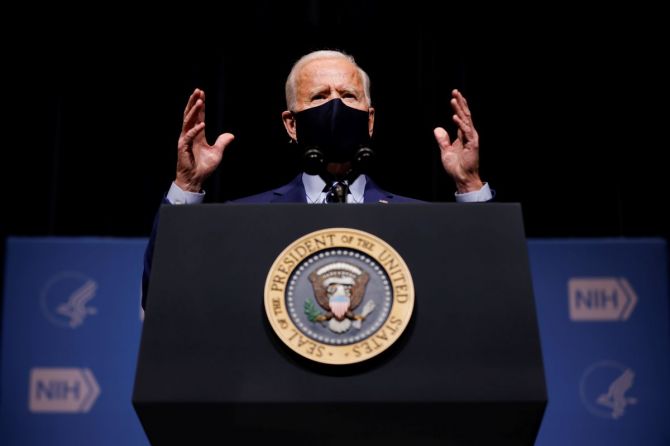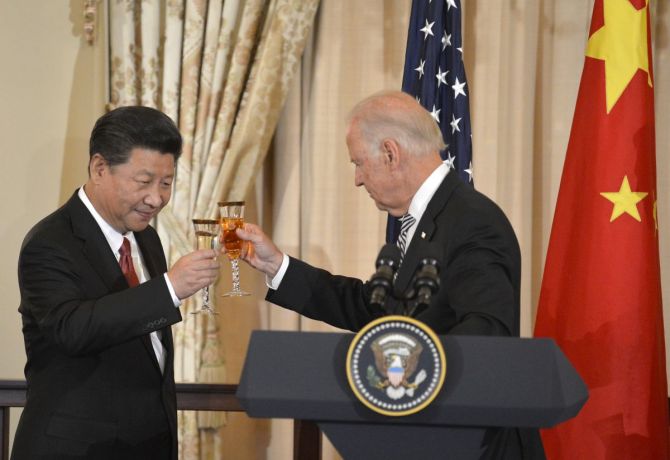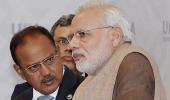'Chinese experts estimate that the new US administration is 'at the crossroads of how to re-manage and control' Sino-American differences and strategic divergences and Biden's bottom line is that the US would have 'extreme competition with China, but won't allow competition to develop into conflict',' notes Ambassador M K Bhadrakumar.

What distinguishes the new US administration is that there has never been an American president before with anywhere near the foreign policy experience that Joe Biden possesses.
Biden brings into the presidency enormous experience spanning over half a century, through his continuous stretch in the US Senate and the White House from 1973 to 2016 and beyond.
Biden himself recalled last week, 'I've probably spent more time with Xi Jinping I'm told than any world leader has.'
Biden hosted Xi in his February 2012 visit to the US as vice president, and accompanied the latter throughout the tour at Xi's suggestion.
Biden was reciprocating a gesture Xi had showed just the previous year when he visited China as vice president.
They clocked countless hours of conversation in confidence.
Suffice to say, Biden's phone call to Xi on Thursday is the continuation of a personal relationship.
Xi poignantly recalled an anecdote at a private dinner on the Tibetan plateau during Biden's 4-day visit in 2011, when the latter defined America in one word: Possibilities.
Xi reminded Biden: 'You've said that America can be defined in one word: Possibilities. We hope the possibilities will now point toward an improvement of China-US relations.'
Biden's exact words in 2011 were, 'We (America) believe anything's possible if we set our mind to it, unlike any other country in the world.'
To be sure, Biden's call with Xi on Thursday needs to be weighed in a complex, unique backdrop.
Neither the taciturn White House readout nor the more detailed Xinhua report (external link) can do justice to it.
Biden himself disclosed later on Friday during a meeting with US senators in the White House, 'Last night, I was on the phone for two straight hours with Xi Jinping. And you all know as well as I do, these folks -- and it was a good conversation. I know him well. We spent a lot of time together over the years I was vice president.'
Biden went on to shower praise on China's 'major, major new initiatives on rail. And they already have rail that goes 225 miles an hour with ease. They're working -- they're working very hard to do what I think we're going to have to do...
'They're going to -- they're working very hard to try to move in a position where they end up being the source of a -- of a new way in which to power automobiles, which would -- they're going to invest a lot of money.
'They're investing billions of dollars and dealing with a whole range of issues that relate to transportation, the environment, and a whole range of other things. So we just have to step up.'
These were not just rambling anecdotal references.
Biden was taking the first meeting of a bipartisan group of senators in his office Friday to "discuss the critical need for investing in modern and sustainable American infrastructure."
The White House readout (external link) said, the meeting
- 'Established the mutual understanding that America needs to build new infrastructure across urban and rural areas and create millions of good-paying jobs in the process to support the country's economic recovery in the months and years ahead'; and,
- 'The senators were sensitised about the Administration's "vision for building sustainable infrastructure that will withstand the impacts of climate change and fuel an American clean energy revolution ... how the administration will bring construction, manufacturing, engineering, and skilled-trades jobs -- with the choice to join a union -- directly to the communities that are too often left behind.'

Biden seems to have followed up already the concluding sentence in the White House readout of the Biden-Xi conversation the previous day: 'President Biden is committed to pursuing practical, results-orient engagements (with China) when it advances the interests of the American people...'
It comes as no surprise that the Chinese side sounds optimistic.
The Chinese expert opinion is that the timing of Biden's first call to Xi as POTUS on Chinese New Year's Eve is to be interpreted as a gesture of goodwill 'to balance the tough messages the new US administration sent in recent days and various interpretations on those messages.'
While assessing Biden's call with Xi, Chinese experts estimate that the new US administration is 'at the crossroads of how to re-manage and control' Sino-American differences and strategic divergences and Biden's bottom line is that the US would have 'extreme competition with China, but won't allow competition to develop into conflict.'
Clearly, China-US relations have become complicated, as is evident in the setting up of a new Pentagon task force (external link) on Wednesday to review US defence policy toward China, which is 'an unprecedented institutional arrangement for the US military.'
Indeed, if this trend continues, 'it will bring strategic risks that the US cannot bear.'
Therefore, the Biden administration will have to talk with China over how to manage the relationship.
The Chinese commentaries (here (external link) and here (external link) have noted:
- 'What is most important is, how to view the relationship between frictions and cooperation, and whether strategic rationality of both sides could gain the upper hand will be the decisive factor for the future of China-US relations';
- Biden's call to Xi can be a 'trend-setter' as it shows the the two sides are willing to push bilateral ties forward in a more positive direction and in turn 'lays the foundation for upcoming contact';
- Admittedly, there us resistance from hardliners who will put up huge obstacles in the way of attempts to repair the relationship with China, but that is where 'Biden can give play to his imagination and bring bilateral relations back to the right track of normalisation';
- Biden is 'facing domestic pressure to avoid getting too close to China', but he made the call nonetheless, which demonstrates his willingness to improve ties, and to bring divergences under control.
'It is a good sign that bilateral relations won't deteriorate and spin out of control';
- As can be expected, Biden brought up Hong Kong, Taiwan and Xinjiang, 'but unlike his predecessor, Biden is willing to bring those divergences under control through dialogue, instead of unilaterally slapping sanctions on China. This shows Biden's goodwill when it comes to preventing the further deterioration or relations';
- As token of goodwill, on Tuesday, Biden withdrew Trump's directive requiring US schools and universities to disclose their partnerships with Confucius Institutes and yet the next day he also set up the Pentagon task force. Clearly, the Biden administration adopting a strategy 'mixing soft and harsh approaches' whereby cooperation will expand but tough stance toward China will still prevail.
On the whole, Chinese experts are making a realistic assessment.
Xi offered cooperation in fighting the COVID-19 pandemic, promoting world economic recovery and maintaining regional peace and stability.
Xi also proposed the revival of the various dialogue mechanisms between China and the US.
China is watching closely (external link) how faced with inflation risks and the ballooning budget deficit, not to mention the long-term economic challenges that lie ahead, how the Biden administration could mobilise more investment in infrastructure and elsewhere that are so vital for the country's future economic growth.
China hopes that engagement will inevitably open up 'possibilities' -- to borrow Biden's expression.
The only caveat is that the US side should respect China's core interests and "act prudently" apropos the Taiwan question and issues relating to Hong Kong, Xinjiang, etc. that are China's internal affairs and concern its sovereignty and territorial integrity.
Ambassador M K Bhadrakumar served the Indian Foreign Service for more than 29 years.
Feature Presentation: Aslam Hunani/Rediff.com










